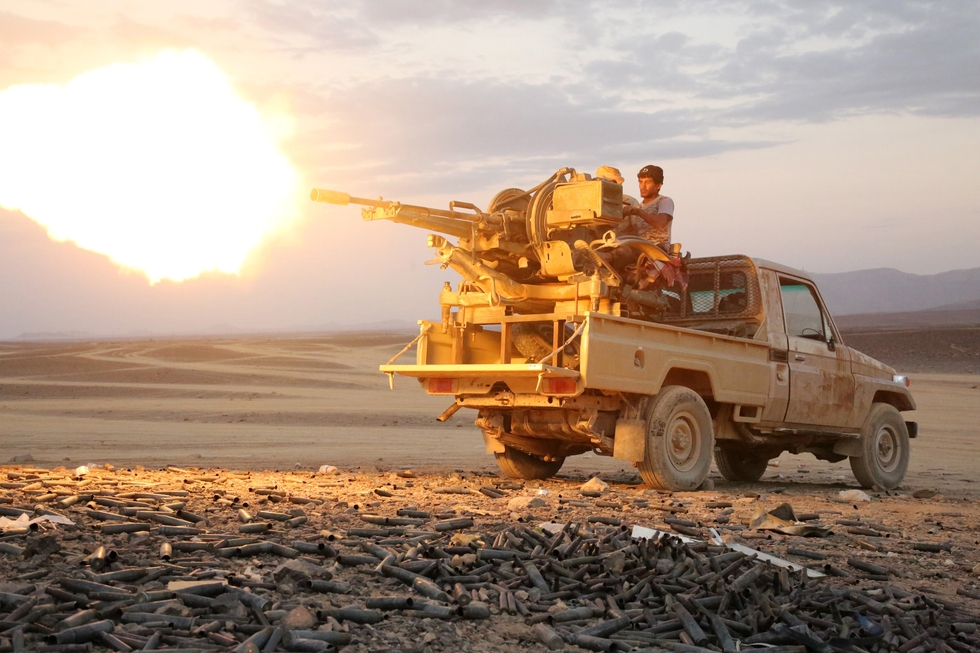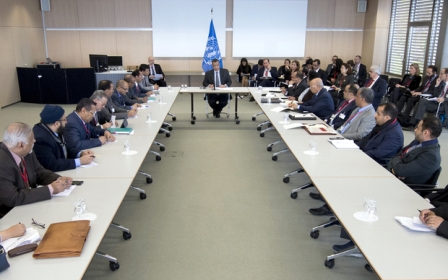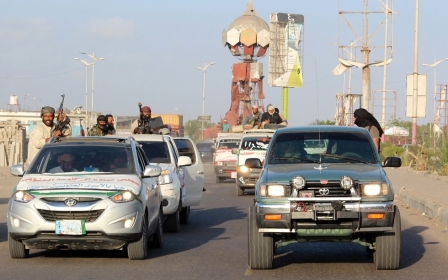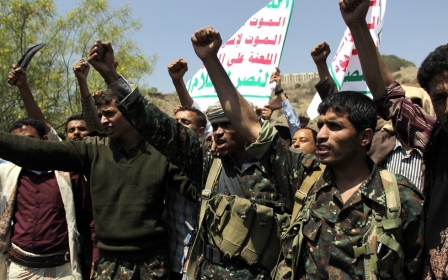Yemen's warring sides agree to form ceasefire monitoring committee

Negotiators taking part in Yemen peace talks in Switzerland agreed on Saturday to create a "neutral" committee to monitor the country's fragile ceasefire after new clashes left it in tatters, a source close to the talks told AFP.
"There is an understanding over forming a neutral military committee tasked with monitoring the ceasefire," a source close to the government delegation said.
The development came after the ceasefire, which took effect on Tuesday and was supposed to last a week, all but collapsed on Friday as government forces seized two towns from the Houthi militia and Saudi-led Arab coalition allies accused the militiamen of escalating the conflict by firing ballistic missiles.
At least 68 people were killed near the northern town of Haradh, which was overrun by loyalists on Thursday, military and tribal sources said.
The casualties were 28 troops and 40 Shiite Huthi rebels, with another 50 Huthis and 40 loyalists wounded.
The United Nations confirmed that Sunday would be the last day of the talks.
UN special envoy for Yemen Ismail Ould Cheikh Ahmed had on Friday voiced alarm at the widespread ceasefire violations.
His office said the negotiating parties in Switzerland had created "a coordination and de-escalation committee ... to strengthen adherence to the cessation of hostilities".
The negotiators met at a hotel in the northwestern Swiss city of Biel for a fifth day of talks Saturday as they scramble to end the spiralling conflict, which has killed more than 5,800 people since March.
Little progress
But sources close to both delegations told AFP Saturday afternoon that the talks had ended for the day with little progress.
A source close to the delegation representing President Abd Rabbouh Mansour Hadi's government said there had been no agreement on the general framework for the talks and no agreement on the opening of humanitarian corridors.
On Thursday, the UN had said that the two sides had agreed to "a full and immediate resumption of humanitarian assistance" in the flashpoint city of Taez in what the UN envoy had called "a major step forward".
But a local relief group, the Humanitarian Relief Coalition, said no UN aid had reached the city, accusing rebels of blocking aid delivery to areas where Hadi loyalists were holed up.
In a letter submitted by the government delegation to the talks Saturday a lawyer in Taiz accused the Houthi militia of confiscating aid sent by the UN World Food Programme.
In another move that had been seen as promising, the pro-government forces and the Houthi militia completed an exchange of hundreds of prisoners in the southern province of Lahj on Thursday.
But the government delegation source told AFP the sides on Saturday had failed to agree any further such moves.
"There has been no progress in the detainees issue," he said.
A member of the delegation representing both the Iran-backed Houthi Shia militia and renegade troops still loyal to wealthy ex-president Ali Abdullah Saleh, told AFP it did not expect any agreement on further prisoner exchanges before a sustainable ceasefire had been decided.
Government forces advance closer to Houthi-held capital
Fighting raged between government forces and the Houthi militia on Saturday, and loyalists were within 40 kilometres (25 miles) of the rebel-held capital, military sources said.
Pro-Hadi forces supported by a Saudi-led coalition were keeping up pressure in Nihm district, Sanaa province, after significant gains in Marib province, east of the capital.
The forces loyal to President Hadi and allied tribes in the area have laid siege to Nihm's Fardha military base, northeast of the capital.
Despite the proximity, the roughly 40 kilometres separating Nihm from Sanaa is mostly rugged mountainous terrain.
On Friday, loyalists seized Hazm, capital of Jawf province, to the northeast of Sanaa.
By Saturday, they had extended their gains in Jawf, capturing Al-Ghayl and Al-Maton districts, according to sources in the pro-Hadi Popular Resistance forces.
The two areas fell after clashes between advancing forces and Houthi militia and renegade troops loyal to Saleh, said Ameen al-Ukaymi, a tribal chief of the Popular Resistance.
Government forces are now heading west, toward the contiguous rebel strongholds of Amran and Saada provinces, which lie immediately to the north of the capital, Ukaymi said.
Yemen's conflict began in September 2014, when the Houthi militia advanced from their northern strongholds to occupy the capital Sanaa.
It has escalated dramatically since Saudi-led air strikes against the militia began in March, with more than 5,800 killed and more than 27,000 wounded since then, according to the UN.
Middle East Eye propose une couverture et une analyse indépendantes et incomparables du Moyen-Orient, de l’Afrique du Nord et d’autres régions du monde. Pour en savoir plus sur la reprise de ce contenu et les frais qui s’appliquent, veuillez remplir ce formulaire [en anglais]. Pour en savoir plus sur MEE, cliquez ici [en anglais].




